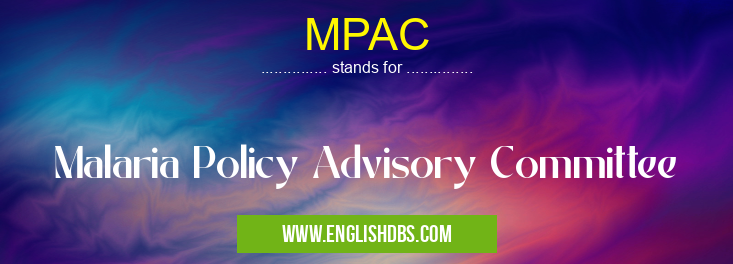What does MPAC mean in ADVISORY
MPAC stands for Malaria Policy Advisory Committee. It is a committee established within the World Health Organization (WHO) to provide strategic guidance and advice on malaria policy and programming.

MPAC meaning in Advisory in Business
MPAC mostly used in an acronym Advisory in Category Business that means Malaria Policy Advisory Committee
Shorthand: MPAC,
Full Form: Malaria Policy Advisory Committee
For more information of "Malaria Policy Advisory Committee", see the section below.
Role of MPAC
- Provides strategic direction and guidance to the WHO on all aspects of malaria policy, including prevention, control, and elimination.
- Reviews and advises on scientific evidence and best practices for malaria control and elimination.
- Identifies and addresses emerging issues and challenges related to malaria.
- Supports the development and implementation of global strategies and guidelines for malaria control and elimination.
Composition of MPAC
MPAC is composed of 12-20 experts selected from diverse disciplines, including:
- Malaria researchers and scientists
- Public health experts
- Malaria control and elimination program managers
- Representatives from non-governmental organizations and the private sector
Essential Questions and Answers on Malaria Policy Advisory Committee in "BUSINESS»ADVISORY"
What is the MPAC?
The Malaria Policy Advisory Committee (MPAC) is a group of experts that provides independent advice to the World Health Organization (WHO) on malaria policy. MPAC members are drawn from a wide range of disciplines, including epidemiology, public health, entomology, and social sciences.
What is the role of the MPAC?
The MPAC provides advice to the WHO on all aspects of malaria policy, including:
- The development of new malaria control and elimination strategies
- The evaluation of existing malaria control and elimination strategies
- The allocation of resources for malaria control and elimination
- The development of policies to address the social and economic impact of malaria
Who are the members of the MPAC?
The MPAC is composed of 15 members, who are selected by the WHO Director-General. Members are chosen for their expertise in malaria and their commitment to providing independent advice. The current members of the MPAC are listed on the WHO website.
How does the MPAC operate?
The MPAC meets twice a year to discuss malaria policy issues. The committee's meetings are open to the public, and the minutes of the meetings are published on the WHO website. The MPAC also works through subcommittees and task forces to develop specific recommendations on malaria policy.
What is the impact of the MPAC?
The MPAC has played a significant role in the development of global malaria policy. The committee's recommendations have helped to shape the WHO's Global Malaria Strategy, and the MPAC has also provided advice on specific malaria control and elimination programs. The MPAC's work has helped to reduce the burden of malaria worldwide.
Final Words: MPAC plays a crucial role in shaping global malaria policy and guiding the WHO's efforts to combat this deadly disease. By providing expert advice and strategic direction, MPAC contributes to the development of effective and evidence-based approaches for malaria control and elimination, ultimately aiming to reduce the burden of malaria worldwide.
MPAC also stands for: |
|
| All stands for MPAC |
